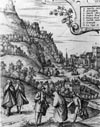The Spanish Inquisition and the Morisco question under the reign of Carolus V. Unprecedented doctrinal and judicial administration adjustments (1516-1524)
Abstract
If the temperance of the Spanish Inquisition is usually interpreted under a Mohammedan approach as a consequence of political, social and economic factors, this article favours the idea that the Spanish Inquisition’s jurisprudence contributed in the definition of criminal law during the reign of Charles V. At the origins of the outrages committed during the generalship of Diego de Deza and the judicial practice reform triggered by Cardinal Jiménez de Cisneros, the Spanish Inquisition defined a line of action based on the most rigorous compliance with the law actually motivated by an imperative of judicial conformism. Between 1516 and 1524, having to face theological and judicial ambiguities underlying the Morisco question and the contradictions in royal legislation, the Spanish Inquisition willingly delayed the process of unification in judicial practice and unprecedented adjustments relative to judicial administration, which doctrinal impact was transcending in terms of penal restraint and on a wider scale, in the Spanish Inquisition’s perception of heretic manifestations.
Downloads
-
Abstract379
-
PDF (Español (España))348

The published works by this Journal are subject to the following terms:
1. The Publication Service of the University of Murcia (the Editor) owns the copyright of its publications. It promotes and allows its use under the indicated licence in Section 2.
© Servicio de Publicaciones, Universidad de Murcia, 2011
2. Papers are digitally published under the licence Creative Commons Reconocimiento-NoComercial-SinObraDerivada 3.0 España (legal text). They can be copied, used, disseminated, transferred and publically presented if: i) the author is quoted, as well as the original source of publication (Journal, editorial and URL); ii) they are not used for commercial purposes; iii) the licence of use is mentioned.
3. Auto-file Conditions. It is allowed and authors are encouraged to digitally disseminate their pre-print versions (versions prior to review) and/or post-print (reviewed version accepted for its publication) since it promotes its early diffusion and the corresponding increase of quotes and scope within the academic community. RoMEO Colour: green.

